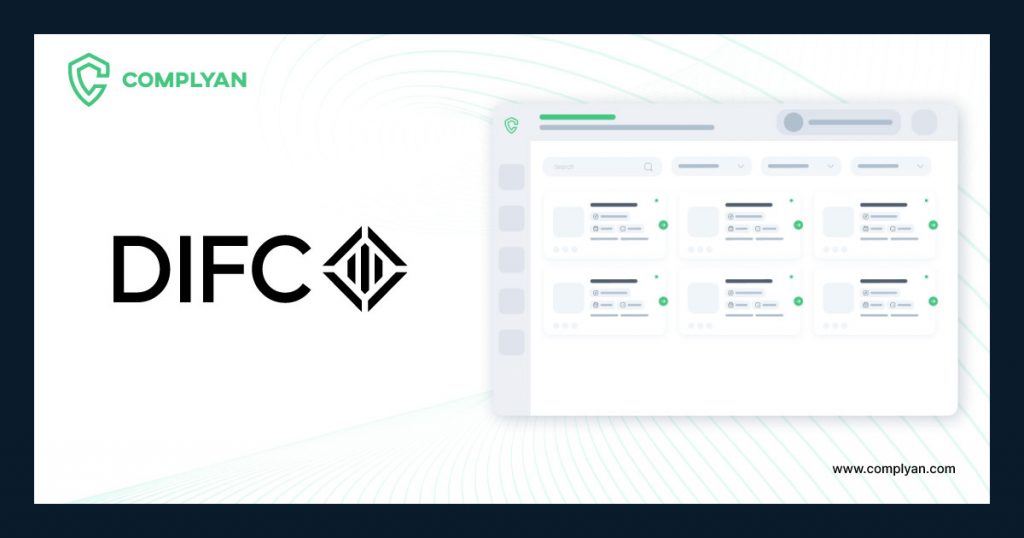Complying with the DIFC Data Protection Regulation; How Complyan Can Help Organizations

The DIFC Data Protection Regulation (DPR) is a comprehensive data protection law that applies to all organizations that process personal data of individuals in the Dubai International Financial Centre (DIFC). It is a data protection regulation based on the EU General Data Protection Regulation (GDPR). The regulation aims to ensure organizations obtain consent from individuals before processing their personal data, take appropriate security measures to protect personal data and comply with individuals’ rights to access, correct, and erase their personal data.
Compliance with the DIFC DPR is important for many reasons. First, it helps to protect the privacy of individuals whose personal data is processed by organizations in the DIFC. Second, it helps to ensure that organizations are operating in a transparent and accountable manner. Third, it helps to mitigate the risk of organizations being fined or penalized for non-compliance.
Considering the number of cybersecurity frameworks and regulations organizations are required to follow, efficiently implementing and complying with all of them can be a daunting task. This blog will discuss how Complyan, a tailored cybersecurity compliance platform, can help organizations comply with the DIFC DPR.
Understanding the DIFC Data Protection Regulation
Scope of the regulation
The DIFC DPR applies to all organizations that process personal data of individuals in the DIFC. Personal data is any information relating to an identified or identifiable natural person. This includes information such as a person’s name, address, email address, phone number, and date of birth.
Requirements of the regulation
The DIFC DPR sets out several requirements for organizations that process personal data. These requirements include:
- Obtaining consent from individuals before processing their personal data. Organizations must obtain consent from individuals before processing their personal data. Consent must be freely given, specific, informed, and unambiguous. Organizations must be able to demonstrate that they have obtained consent from individuals.
- Taking appropriate security measures to protect personal data. Organizations must take appropriate security measures to protect personal data from unauthorized access, use, disclosure, modification, or destruction. These measures should be proportionate to the risks posed to the personal data.
- Complying with individuals’ rights to access, correct, and erase their personal data. Individuals have the right to access their personal data, to have their personal data corrected if it is inaccurate, and to have their personal data erased if it is no longer necessary for the purpose for which it was collected. Organizations must comply with these rights within a reasonable time frame.
- Notifying the DIFC Data Protection Office (DPO) of any data breaches. Organizations must notify the DIFC Data Protection Office (DPO) of any data breaches within 72 hours of becoming aware of the breach. The notification must include the following information:
- The nature of the breach
- The number of individuals affected by the breach
- The steps that the organization has taken to mitigate the impact of the breach
- Cooperating with the DIFC DPO in any investigations. Organizations must cooperate with the DIFC Data Protection Office (DPO) in any investigations into compliance with the DIFC DPR. This includes providing the DPO with access to their records and systems.
Role of the DIFC Data Protection Office (DPO)
The DIFC Data Protection Office (DPO) is an independent body that is responsible for overseeing compliance with the DIFC DPR. The DPO has many responsibilities, including:
- Providing guidance and advice to organizations on data protection and privacy issues.
- Investigating complaints about non-compliance with the regulation.
- Taking enforcement action against organizations that are not in compliance with the regulation.
- Penalties for non-compliance
Enforcement mechanisms
The DIFC DPR is enforced by the DIFC Data Protection Office (DPO). The DPO has the power to:
- Issue warnings to organizations that are not in compliance with the regulation.
- Fine organizations that are not in compliance with the regulation.
- Suspend or revoke the registration of organizations that are not in compliance with the regulation.
Organizations found to be in breach of the DIFC DPR may be subject to a fine of up to AED 500,000. In addition, the DIFC DPO may suspend or revoke the organization’s registration.
How Complyan Supports Compliance with the DIFC DPR

Complyan is a powerful tool that can help organizations of all sizes comply with the DIFC DPR. The platform’s comprehensive features and modules, combined with its training and consulting services, make it an ideal solution for organizations that are serious about data privacy and security. Complyan can help address DIFC DPR requirements in the following ways:
- Obtaining consent from individuals before processing their personal data
The DIFC DPR requires organizations to obtain consent from individuals before processing their personal data. Complyan’s Data Security and Privacy Module can help organizations obtain consent in a compliant manner. The module includes features for creating and managing consent forms and tracking consent history. - Taking appropriate security measures to protect personal data
The DIFC DPR requires organizations to take appropriate security measures to protect personal data from unauthorized access, use, disclosure, alteration, or destruction. Complyan’s Data Security and Privacy Module can help organizations implement appropriate security measures. The module includes features for data classification, inventory, and access control, as well as tools for conducting risk assessments and developing and implementing security policies. - Complying with individuals’ rights to access, correct, and erase their personal data
The DIFC DPR gives individuals the right to access, correct, and erase their personal data. Complyan’s Data Security and Privacy Module can help organizations comply with these rights. The module includes features for managing individual data requests, as well as tools for correcting and erasing personal data.
Other Complyan Modules also help achieve compliance with DIFC DPR in the following ways:
- Third-Party Management Module: The Third-Party Management Module can help organizations manage their relationships with third-party vendors and service providers. It includes features for vendor risk assessment, due diligence, and contract management. This can help organizations comply with the DIFC DPR’s requirement to assess and manage the risks posed by third-party vendors and service providers.
- Cyber Risk Management Module: The Cyber Risk Management Module can help organizations identify, assess, and manage their cyber risks. It includes features for threat intelligence, vulnerability management, and incident response. This can help organizations comply with the DIFC DPR’s requirement to take appropriate security measures to protect personal data from unauthorized access, use, disclosure, alteration, or destruction.
- Information Security Policy Builder Module: The Information Security Policy Builder Module can help organizations create and maintain comprehensive information security policies. It includes features for policy creation, documentation, and distribution. This can help organizations comply with the DIFC DPR’s requirement to have in place appropriate technical and organizational measures to protect personal data.
Benefits of using Complyan for DIFC Data Protection Regulation (DPR) compliance:
- Comprehensive solution for achieving compliance: Complyan is a comprehensive platform that provides organizations with the tools and resources they need to achieve compliance with the DIFC DPR. It offers various modules for data security, third-party management, cyber risk management, and information security policy management.
- Simplifies the implementation of data protection and privacy practices: Complyan can help organizations simplify the implementation of data protection and privacy practices. It provides a centralized repository for all data protection and privacy information, including tools to help organizations automate tasks and processes.
- Leverages technology to streamline compliance efforts and mitigate risks effectively: Complyan leverages technology to streamline compliance efforts and mitigate risks effectively. The platform allows organizations to track compliance progress, identify and mitigate risks, and generate reports to demonstrate compliance to regulators and stakeholders.
In addition to these benefits, Complyan also offers a variety of other features and services that can help organizations comply with the DIFC DPR, including:
- Training: Complyan offers a variety of training courses on data privacy and security. These courses can help employees understand their responsibilities under the DPR and how to protect data.
- Consulting: Complyan offers consulting services to help organizations implement and maintain compliance with the DPR. These services can help organizations assess their compliance needs, develop and implement a compliance plan, and train employees on data privacy and security.
- Reporting: Complyan provides a variety of reports that can help organizations track their progress towards compliance with the DPR. These reports can be used to demonstrate compliance to regulators and stakeholders.





 Governance and Policy Management
Governance and Policy Management